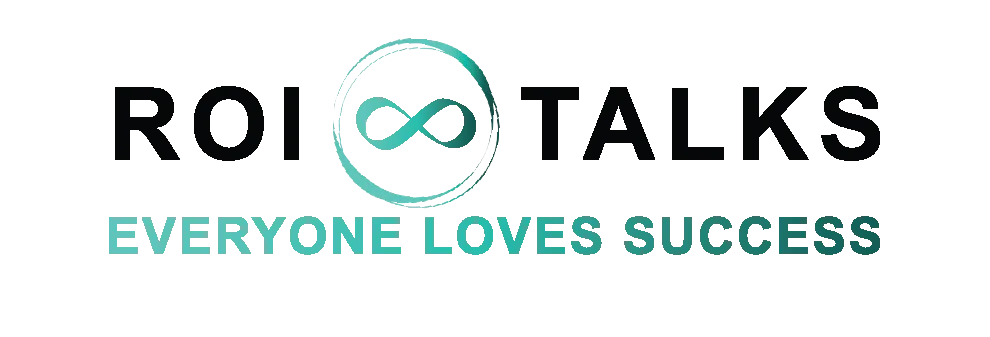Everyone Loves Success
ROI TALKS
Roi Talks Blog

5. Assertive | Soul of Sales - The Nine Universal Laws
I often hear the word from many so-called sales managers, directors and gurus to be aggressive with your sales (I hear them say you need to dominate the market).
The whole phrase is a cringe factor for many, the energy around it comes across as very creepy and untrustworthy. In psychology, aggression means portraying behaviour resulting in both physical and psychological harm to oneself, others or objects in the environment. The core focus of such interaction leads to harming another person, either physically, emotionally or mentally.
In sales terms this means to win/succeed by hook or crook, there is no mercy. Dorland's Medical Dictionary defines assertiveness as: "a form of behaviour characterized by a confident declaration or affirmation of a statement without need of proof; this affirms the person's rights or point of view without either aggressively threatening the rights of another (assuming a position of dominance) or submissively permitting another to ignore or deny one's rights or point of view." I prefer the assertive sales route any day.
Assertiveness in sales is a communication style that involves expressing oneself in a clear, confident and direct manner, without infringing on the rights of others. Unlike aggression, assertiveness is not about dominating or intimidating others, but rather about expressing one's needs, opinions and boundaries while respecting those of others.
In sales, assertiveness is an effective approach that can help build trust, credibility and long-term relationships with clients. By clearly articulating the benefits of one's product or service, addressing any concerns or objections in a respectful manner, and negotiating with confidence and transparency, a salesperson can demonstrate their professionalism and expertise while building rapport with the client.
Imagine a salesperson is selling a new software product to a potential client. The client expresses some concerns about the cost and the implementation process. Instead of becoming defensive or dismissive, the salesperson could respond with empathy and understanding, while also addressing the concerns in a clear and confident manner. For example, they might say something like, "Thank you for making us aware of your concerns about the cost and implementation process. Let me explain how our product can actually save you time and money in the long run, and how we can work with you to make the implementation process as smooth as possible." By using assertiveness in this way, the salesperson is demonstrating their professionalism and expertise, while also respecting the client's concerns and needs.
A study published in the Journal of Marketing Research found that salespeople who used an assertive communication style, which involved expressing their needs and opinions clearly and directly while also being sensitive to the needs of the customer, were more successful in building trust and rapport with customers than those who used a submissive or aggressive style. Another study published in the Journal of Personal Selling and Sales Management found that salespeople who were perceived as assertive and confident were more successful in achieving their sales goals than those who were perceived as passive or aggressive.
There are numerous stories of how assertiveness in sales has led to success. For example, there is a story of a salesperson who was able to secure a large contract with a major corporation by being assertive and confident in their pitch. The salesperson had done their research and knew exactly what the client needed, and they were able to clearly articulate how their product could meet those needs in a way that no other competitor could. By being assertive and confident in their approach, the salesperson was able to build trust and credibility with the client and ultimately close the deal.
In contrast, there are also stories of how aggressive sales tactics have backfired. For example, there is a story of a salesperson who used high-pressure tactics to try to close a sale, even though the client had expressed some reservations. The salesperson continued to push and manipulate the client, which ultimately led to the client ending the conversation and not wanting to do business with the salesperson or their company again.
An aggressive sales approach can be counterproductive and even harmful to the salesperson's reputation and the client relationship. This approach often involves pressuring or manipulating the client into making a purchase, using tactics such as false urgency, intimidation, or misleading information. Such tactics can result in a sale in the short term but can damage the client's trust and loyalty in the long term.
Here is a framework for being assertive in sales:
Prepare: Before engaging with a potential client, take the time to prepare thoroughly. This includes doing research on the client, their needs, and their pain points, as well as preparing your pitch and responses to potential objections. By being well-prepared, you can approach the conversation with confidence and clarity.
Listen: Once you engage with the client, listen attentively to their needs and concerns. This demonstrates that you respect their perspective and are focused on meeting their needs, which helps build rapport and trust.
Acknowledge: After listening, acknowledge the client's concerns and needs. This shows that you understand and respect their perspective, which can help put them at ease and make them more receptive to your pitch.
Assert: After acknowledging the client's perspective, assert your own perspective and the value of your product or service. Use clear and confident language to articulate the benefits of your product or service, and how it can meet the client's needs.
Negotiate: If the client expresses concerns or objections, negotiate in a confident and transparent manner. This involves addressing their concerns directly and presenting potential solutions or alternatives. By negotiating in a respectful and transparent way, you can demonstrate your professionalism and expertise while also building trust and credibility with the client.
Close: Finally, once you have addressed the client's concerns and presented the value of your product or service, close the deal in a confident and professional manner. This may involve summarizing the benefits of your product or service, reiterating the value it can provide to the client, and asking for their business.
Assertiveness in sales is an effective approach that involves expressing oneself confidently and directly while also respecting the needs and boundaries of others. Research has shown that assertive salespeople are more successful in building trust and rapport with clients, and that assertiveness is more effective than both passive and aggressive styles. Stories and examples also demonstrate the power of assertiveness in sales, while also highlighting the potential negative consequences of aggressive tactics.
You can be assertive in sales while also respecting the needs and boundaries of the client. This approach can help you build trust and credibility with clients, while also achieving your sales goals.
ROI TALKS™
Marina Plaza - Office 1004 -1006
Dubai Marina, Dubai, UAE





